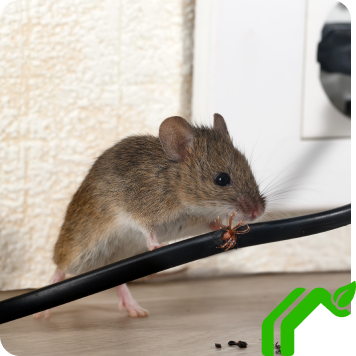
Several rodents can create trouble in Chandler yards. They damage lawns, chew on trees, cut down plants in landscaping, and do other wonderful things. But, today, we’re going to focus less on these lawn rodents and furry-tailed rodents and put a spotlight on rats and mice. They’re the ones that get into your home, make noises in your walls, and damage your stuff. Our goal is to unravel some of the confusion Chandler residents sometimes have about rodent control. We’ll discuss what works, what doesn’t, and most of all, how professionals handle rodent pest control in Chandler. When you’re done reading, you’ll know everything you need to know about rodent control. Are you ready? Let’s get right into it.
What Kinds Of Rodent Control Exist?
There are many ways to control rodents. Some are gentle. Some are aggressive and lethal. We can understand why you would want to go after rats and mice with both barrels and give them everything you’ve got, but that strategy can lead to trouble if you don’t apply your rodent control products correctly. If you decide to be gentle, that can fall short as well. Natural methods can have a variety of results, and some of them are not good at all.
Traps: The tried-and-true method of rodent control is the deployment of spring traps or snap traps. Both work well to capture rodents. Unfortunately, when deployed incorrectly, rats and mice will avoid capture. Rodents can avoid even the smartest, fanciest, and most expensive traps available. There are many reasons for this. Professionals use methods and field-tested strategies to outsmart rodents and follow up with inspections to make sure the trapping program achieves the desired results. When untrained individuals deploy traps, they often get no results. What’s worse, improperly deployed traps can harm rodents. When a little mouse gets its leg caught in a spring trap, it will chew it off to escape.
Rodenticide: These are the products that rodents eat. After a lethal dosage, you won’t have any more trouble with those rodents. But, there is a drawback to using rodenticide to solve rodent problems. If rodents die in your walls, they’re going to create a foul odor. Professionals use this rodent control method when rodents are not yet inside a structure. It effectively reduces rodent populations and is useful against large populations. Is this method safe for your dog or cat? It is okay for your pet to eat rodents that are exposed to most rodenticides used by professionals, but certain over-the-counter products present a risk. Why are professional-grade rodenticides safer? Anticoagulant baits used in rodent control are formulated with low dosages of active ingredients and are put in protective, tamper-resistant devices. A dog or cat would have to have access to bait and eat a large amount compared to what is required to stop a mouse or a rat. Neither is possible with professional control.
Repellents: Many products are geared toward driving rodents out of structures naturally. The most common is naturally derived sprays, such as a peppermint oil repellent. While repellents have some efficacy, they fall short when not properly administered. Weather conditions can impact the success of treatments, rodents can avoid treated areas, and sometimes they just put up with the smell. When rodent control fails, you’ll continue to have health implications and property damage.
These are the primary methods for controlling rodent activity and removing rodents from homes. We did not touch on all of the many home remedies that are available through online video resources and social media. The home remedies offered by online influencers typically have zero impact on rodents or are entirely untested in research environments. When someone puts out a product to stop rodents and has no more issues with rodents after using their home remedy, they think the product they created was successful. But this is speculative. Often, the results have little or nothing to do with the home remedy applied.
Now, let’s take a look at a product you’ll find at the store that promises to naturally repel rodents with little or no effort on your part. They’re called ultrasonic rodent repellers.



